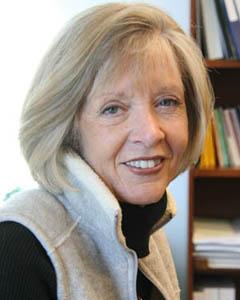Meet EPA Chemist Linda Sheldon, Ph.D.

Science to help protect children
Environmental chemist Linda Sheldon, Ph.D, is the Associate Director for Human Heath in the National Exposure Research Laboratory at the EPA's Office of Research and Development (ORD). She has been with the EPA for more than 14 years. She studies environmental exposure to people, particularly focusing on children's environments and their contact with chemicals that can lead to health risk.
Dr. Sheldon has spent over 30 years planning and conducting research to measure and model how chemicals move through the environment, how people come in contact with these chemicals in their everyday lifes. She has three sons and a grandchild—a big part of her motivation for a career devoted to understanding environmental risks to children and how to most effectively develop a healthy environment for children.
How does your science matter?
We understand peoples environments and how they are exposed to chemicals and other pollutants in their everyday lives. Over the last 10 to 12 years, we've been applying the science to understand children's exposures. This information is applied to answer four important questions:
- What chemicals are in places where children live, learn, and play?
- Do children have enough contact with these chemicals to cause a health risk?
- Where do these chemicals come from and how to children come in contact with them, so we can reduce any potential risks.
- Do those reduction procedures actually have an impact.
Until you know what's happening, you don't know if there's a risk, and you don't know what to do about it.
If you could ask any scientist, any question, what would it be?
I would ask them about how they came to their discovery, what lead up to it, what made them think that way and what led them down that track. Science is a body of knowledge: you go and accumulate knowledge, and then pull it together to make sense of what is happening.
What was that body of knowledge they used to lead them down their path? Most of the time, once people go in a particular direction, it seems so simple, but it's not; it's sort of a body of work. That would be the conversation I would have and would like to hear it from many scientist.
What do you like most about your research?
I have been a scientist for a long, long time and understanding the world and how it works is what I like about it. It's the problem-solving aspects, working with the EPA and understanding children's exposure and how to make their environment better, is something that's important. It really is science that makes our world and our kid's worlds better.
When did you first know you wanted to pursue science?
There are very few women my age that have a Ph.D in science. Essentially, science and math were easy. I liked it, I understood it and it was easy to pursue—the thought process, the working things out has always intriguing to me.
I did not start out thinking I would get a PhD and be a scientist. Each time I finished a degree, I found I wanted to continue to learn more and to understand more. I feel very fortunate, for I've had a career for 35 years, and I've always been fascinated by it.
Can you tell us about a bit more about your educational and science background before that?
I got my bachelor's degree from Cornell University in chemistry, my master's from UC Davis in agricultural chemistry, and my Ph.D from the University of Michigan in environmental chemistry.
My husband was in Boston while I was in Michigan studying. After I finished my Ph.D, I moved to Boston and had a post doctoral position at MIT. I came down to the Research Triangle Institute here in North Carolina in 1978 and worked there for 20 years before I came to EPA.
What's the most important thing you've worked on at EPA?
Most of my job at EPA has been to develop and lead a human exposure program. It has involved identifying what is the most important research that needs to be done: how should we do it, and who should do it? It's a body of work.
The children's research that we've done has provided a lot of very, very useful information in understanding children's environments and where their exposures come from. I have also done research to understand how we can use biomonitoring data to tell us about exposures and developed ways to understand how to look at many different exposures at the same time.
If you were not a scientist, what do you think you would be doing?
When I was in high school, I wanted to be a physical education teacher, but nobody would let me because I was really good at sciences and math. I probably wouldn't do that now. I love to garden so I might be a landscaper.
Do you have any advice for students considering a career in science?
You need to learn as much as you can, and you need to be very flexible about what you're going to do with that knowledge. I think that scientists are primarily trained in scientific principles. They are given tools, but over the years, the tools and problems will change, so you really have to be adaptive.
